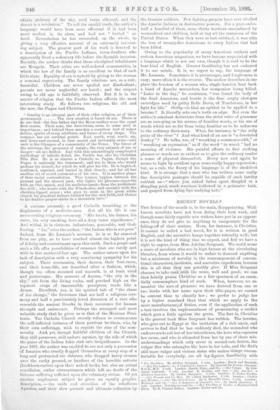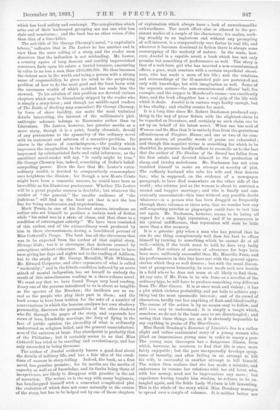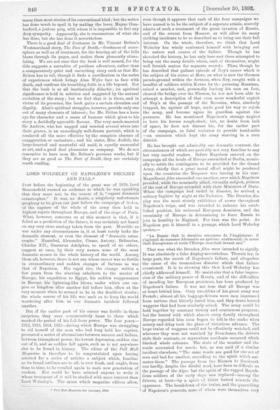RECENT NOVELS.*
THE fiction of the month is, in the main, disappointing. Well- known novelists have not been doing their best work, and though some fairly capable new writers have put in an appear- ance, they do not give us anything to compensate for the falling-off of their seniors. Here, for instance, is Christine. It cannot be called a bad novel, for it is written in good English, and the narrative hangs together tolerably well; but it is not the kind of thing that we expect, and feel we have a right to expect, from Miss Adeline Sergeant. We could name a score of novelists who are in high favour at the circulating libraries, from whom it would be unfair to demand anything but a minimum of novelty in the rearrangement of conven- tional characters, incidents, and narrative expedients, because this is all that they can possibly give. If Miss Sergeant chooses to take rank:with the score, well and good; we can then faintly praise Christine as a fair specimen of an essen- tially commonplace kind of work. When, however, we re- member the sort of pleasure we have derived from one or two books with her name upon their title-pages, we cannot be content thus to classify her ; we prefer to judge her by a higher standard than that which we apply to the mere manufacturer;of fiction, even if the application of such a test involves the unpleasantness of pronouncing a verdict which goes a little against the grain. The fact is, Christine is the poorest book Miss Sergeant has written. The heroine, who goes out to Egypt at the invitation of a rich uncle, and arrives to find that he has suddenly died, the scoundrel who endeavours to rob her of her inheritance, the hero who espouses her cause, and who is alienated from her by one of those mis- understandings which only occur in second-rate fiction, the vulgar flirt who entangles the hero in her toils, and the flirt's still more vulgar and vicious sister who makes things uncom- fortable for everybody, are all lay-figures familiarity with • (1.) Christine. By Adeline Sergeant. 3 vols. London : Hurst and Illaokett. --(2.) The Leaders; or, A Capitalist's Lahoar. By General Sir George Chesney, IC.0,13„ M.P. 3 vols. London : Smith, Elder, and Co.--(3.) Teeipe. By Con- stance Cottorell, 3 vols. Loudon: It. Bentley and Son.--(4. Anythati a Altittarg Romance. By Cathal Zdaeguire. 3 vols. London T. 1 Isher Uuwin. -(13.) WPM= and the Man. By itobert Buchanan. 2 vols. London : Chatto and Winclus.—(0.) The Star-Gasors. By G. Manville Conn. 3 vole. Loudon: Methuen and 0o.—(7.) A Romance of Lincoln's Ina. By Sarah Dondney. 2 vole. London : Hutchinsonand Co. --(S.) The Pace of Death; a Westmoreland Story. By E. Vincent Briton, London: Seeley and Co. which has bred satiety and contempt. The complexities which arise out of their hackneyed grouping are not one whit less stale and wearisome ; and the book has no other raison d'elre than that of a time-killer.
The sub-title of Sir George Chesney's novel, " a capitalist's labour," indicates that in The Lesters he has another end in view than the mere telling of a story, and the reader soon discovers that the indication is not misleading. Mr. Lester, a country squire of long descent and terribly impoverished resources, finds upon his estate a buried treasure, amounting in value to no less a sum than £105,000,000. He thus becomes the richest man in the world, and being a person with a strong sense of responsibility, he gives his mind to the perplexing problem of how to do the most good and the least harm with the enormous wealth of which accident has made him the steward. To his solution of this problem are devoted various chapters which may be blamelessly skipped by the reader who is simply a story-lover ; and though (as middle-aged readers of The Battle of Dorking may remember) Sir George Chesney, by force of sheer lucidity, can make the most technical details interesting, the interest of the millionaire's phil- anthropic schemes belongs to Economics rather than to Literature. The Lesters, however, has genuine merits as a mere story, though it is a quiet, family chronicle, devoid of any pretensions to the symmetry of the ordinary novel with its statement and solution of a narrative-problem. Its charm is the charm of convincingness,—the quality which impresses the imagination in the same way that the reason is impressed by substantiated facts and valid inferences; as the uncritical novel-reader will say, " It really might be true." Sir George Chesney has, indeed, something of Defoe's belief- compelling power. Even the fact that Mr. Lester's extra- ordinary wealth is devoted to comparatively commonplace uses heightens the illusion ; for though a new Monte Cristo might have been a romantic success, he would have been as incredible as his illustrious predecessor. Whether The Lesters will be a great popular success is doubtful; but whatever the verdict of "the general," the smaller audience of "the judicious " will find in the book art that is not the less fine for being unobtrusive and unpretentious.
Mark Twain, in one of his farcical stories, introduces an author who set himself to produce a certain work of fiction while " his mind was in a state of chaos, and that chaos in a condition of extravagant activity." We have been reminded of this author, and of the extraordinary work produced by him in these circumstances, during a bewildered perusal of Miss Cotterell's Tempe. The book has all the cleverness that was to be expected from the author of that capital story, Strange Gods ; but it is cleverness that darkens counsel by conceptions without coherence. Miss Cotterell seems to have been giving her days and nights not to the reading of Addison, but to the study of Mr. George Meredith, Walt Whitman, Mr. Edward Carpenter, and other exponents of what is called " modernity; " and in the febrile condition induced by an aoute attack of mental indigestion, has set herself to embody the result of this miscellaneous reading in a three-volume novel. We must say that we have found Tempe very hard reading. Every one of the persons introduced to us is about as tangible as the spectre of the Brocken ; the incidents are as un- real as the people who play their part in them ; and the book seems to have been written for the sake of a number of conversations in which the heroine analyses her own shadowy personality, discusses the personalities of the other shadows who flit through the pages of the story, and expounds her views of love, friendship, marriage, the duty of flying in the face of public opinion, the absurdity of what is ordinarily understood as religious belief, and the general unsatisfactori- ness of the universe at large. Our standpoint is probably that of the Philistine ; but it certainly seems to us that Miss Ootterell has tried to be startling and revolutionary, and has only succeeded in being tiresome. The author of Amabel evidently knows a good deal about • the details of military life, and has a fair idea of the condi- tions of success in story-telling. Indeed, the book, as a first novel, has genuine promise ; for its merits are the merits of capacity as well as of knowledge, and its faults being those of inexperience, are likely to disappear with practice in the art of narration. The writer, as is the way with many beginners, has handicapped himself with a somewhat complicated plot the evolution of which does not come naturally in the course of the story, but has to be helped out by one of those chapters of explanation which always have a look of unworkmanlike awkwardness. Too much effect also is allowed to the per- sistent malice of a couple of the characters; for malice, work- ing steadily to an inglorious end without any prompting of self-interest, is a comparatively rare factor in real life, and wherever it becomes dominant in fiction there is always some overstepping of the modesty of nature. In the main, how- ever, Amabel is a capable novel, a book which has not only promise but something of performance as well. The story is that of a well-born girl who has married a non-commissioned officer, a poor, weak creature with a certain superficial showi- ness, who has made a mess of his life ; and the relations and surroundings of the ill-matched pair are portrayed not only with knowledge, but with imagination as well. Some of the separate scenes—the non-commissioned officers' ball, for example, and the supper in Morshead's rooms—are excellently done, and the book altogether has a real grip of the life with which it deals. Amabel is in various ways faulty enough, but it has vitality; and vitality counts for much.
It is a long time since Mr. Robert Buchanan produced any- thing in the way of prose fiction with the slightest claim to be regarded as literature, and certainly no such claim can be set up on behalf of his latest novel. When one has said of Woman and the Man that it is entirely free from the gratuitous offensiveness of Foxglove Manor, and one or two of its com- panion stories, all possible words of praise are exhausted ; and though this negative virtue is something for which to be thankful, its presence hardly suffices to reconcile us to the fact that the author of The Shadow of the Sword has fallen from his first estate, and devoted himself to the production of cheap and tawdry melodrama. Mr. Buchanan has not even troubled himself to make an attempt at novelty of plot. The ruffianly husband who robs his wife and then deserts her; who is supposed, on the evidence of a newspaper paragraph, to have died somewhere on the other side of the world ; who returns just as the woman is about to contract a second and happier marriage; and who is finally and con- veniently assassinated—this time without any possible doubt whatever—is a person who has been dragged so frequently through three volumes or three acts, that we wonder how any self-respecting novelist or playwright could dare to trot him out again. Mr. Buchanan, however, seems to be losing all regard for a once high reputation ; and if he perseveres in his cynical indifference, that reputation will soon be little more than a dim memory.
It is a genuine pity when a man who has proved that he can do one thing conspicuously well does his beet to efface himself by turning to something which he cannot do at all well,—which, if the truth must be told, he does very badly indeed. Few writers of stories of adventure for boys have been more uniformly successful than Mr. Manville Fenn, and his performances in this line have met with the general appre- ciation which they so well deserve ; but with the usual discon- tent of prosperous humanity, he must needs seek new laurels in a field where he does not seem at all likely to find them. At any rate, if Mr. Fenn is to win fame as a novelist of the ordinary type, he will have to produce something very different from The Star. Gazers. It is at once weak and violent ; it has a plot which violates probability, and yet fails to achieve any- thing but the most spasmodic interest; and of its crowd of characters, hardly one has anything of flesh-and-blood reality. The course of the action is by no means easy to follow, and still less easy to understand ; it is simply a tangle which, somehow, we do not in the least care to see disentangled ; and seeing that these things are so, it is obviously impossible to say anything in praise of The Star-Gazers.
Miss Sarah Doudney's Romance of Lincoln's Inn is a rather slight and rather sentimental story of a young woman who jilted an impecunious young man in order to marry a peer. The young man thereupon has a dangerous illness, from which, however, he recovers, to find that life is once more fairly enjoyable ; but the peer unexpectedly develops symp- toms of insanity, and after failing in an attempt to kill his wife, is successful in another attempt to kill himself. The widow then realises that she has made a mistake, and endeavours to resume her relations with her old lover, who, with her money, need not be impecunious any more ; but experience having taught him wisdom, he refuses to be en- tangled again, and the fickle Lady Wyburn is left lamenting. This is the whole of the story which Miss Doudney manages to spread over a couple of volumes. It is neither better nor worse than most stories of its conventional kind ; but the writer has done much to spoil it by making the lover, Mayne Oom- herford, a jealous prig, with whom it is impossible to feel any deep sympathy. Apparently, she is unconscious of what she has done, but she has done it nevertheless.
There is a good deal of freshness in Mr. Vincent Briton's Westmoreland story, The Face of Death,—freshness of atmo- sphere as well as of treatment, for the bracing air of the fells blows through its pages, and makes them pleasantly stimu- lating. We are not sure that the book is well named, for the title suggests a narrative of perilous adventure, rather than a comparatively quiet and unexciting story such as that Mr. Briton has to tell, though it finds a justification in the series of experiences which brings Alan Wyke face to face with death, and confirms his trembling faith in a life beyond. Not that the book is at all inartistically didactic ; its spiritual significance is held in solution and suggested by the natural .evolution of the story ; but we feel that it is there, and in virtue of its presence, the book gains a certain elevation and dignity. Alan's spiritual struggles, however, provide only one out of many elements of interest; for Mr. Briton has a keen eye for character and a sense of humour which gives to his story a decidedly agreeable flavour. The very-much-married Sir Andrew, who has nagged and worried several wives into their graves, is an exceedingly well-drawn portrait, which is rendered all the more effective by the complete absence of .exaggeration or caricature ; and his sister, Miss Judith, the large-hearted and masterful old maid, is equally successful as art, and a good deal pleasanter as company. We do not remember to have seen Mr. Briton's previous works, but if they are as good as The Pace of Death, they are certainly "worth reading.




































 Previous page
Previous page